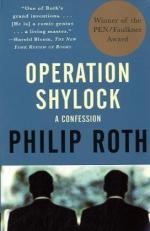|
This section contains 220 words (approx. 1 page at 300 words per page) |

|
Operation Shylock may appear unique in that Roth has manufactured two versions of himself for the principal characters, as well as concocted a broad and liberal blend of fact and fiction. Nonetheless, the method proves a variation — although a highly imaginative one — on older methods. One might argue that Chaucer's host represented the poet as narrator, and that his Canterbury-bound pilgrims combined liberal doses of fact and fiction in their prologues and tales. Closer to Roth's home, however, Marcel Proust (1871-1922) relied heavily upon his knowledge of French social history, particularly during the 1890s when he moved in the most fashionable of Parisian circles and involved himself in the Alfred Dreyfus case. His circularly constructed novel, A le recherche du temps perdu (Remembrance of Things Past, 1913-1927), ends with the narrator, Marcel, discovering his true artistic vocation; that, in turn, leads to the writing...
|
This section contains 220 words (approx. 1 page at 300 words per page) |

|




